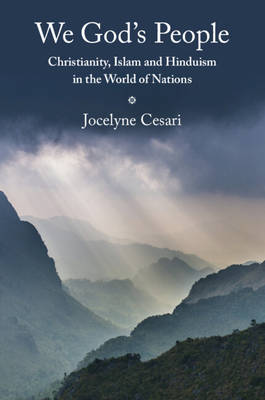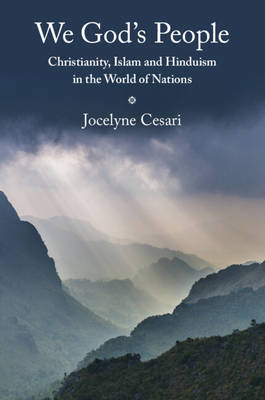
- Afhalen na 1 uur in een winkel met voorraad
- Gratis thuislevering in België vanaf € 30
- Ruim aanbod met 7 miljoen producten
- Afhalen na 1 uur in een winkel met voorraad
- Gratis thuislevering in België vanaf € 30
- Ruim aanbod met 7 miljoen producten
Zoeken
We God's People
Christianity, Islam and Hinduism in the World of Nations
Jocelyne Cesari
Paperback | Engels
€ 60,95
+ 121 punten
Uitvoering
Omschrijving
Cesari argues that both religious and national communities are defined by the three Bs: belief, behaviour and belonging. By focusing on the ways in which these three Bs intersect, overlap or clash, she identifies the patterns of the politicization of religion, and vice versa, in any given context. Her approach has four advantages: firstly, it combines an exploration of institutional and ideational changes across time, which are usually separated by disciplinary boundaries. Secondly, it illustrates the heuristic value of combining qualitative and quantitative methods by statistically testing the validity of the patterns identified in the qualitative historical phase of the research. Thirdly, it avoids reducing religion to beliefs by investigating the significance of the institution-ideas connections, and fourthly, it broadens the political approach beyond state-religion relations to take into account actions and ideas conveyed in other arenas such as education, welfare, and culture.
Specificaties
Betrokkenen
- Auteur(s):
- Uitgeverij:
Inhoud
- Aantal bladzijden:
- 200
- Taal:
- Engels
Eigenschappen
- Productcode (EAN):
- 9781108453745
- Verschijningsdatum:
- 16/12/2021
- Uitvoering:
- Paperback
- Formaat:
- Trade paperback (VS)
- Afmetingen:
- 152 mm x 229 mm
- Gewicht:
- 594 g

Alleen bij Standaard Boekhandel
+ 121 punten op je klantenkaart van Standaard Boekhandel
Beoordelingen
We publiceren alleen reviews die voldoen aan de voorwaarden voor reviews. Bekijk onze voorwaarden voor reviews.











